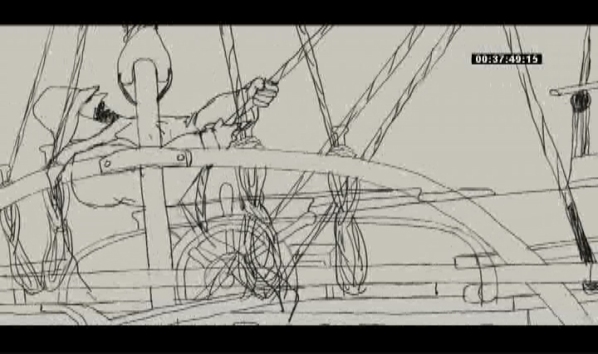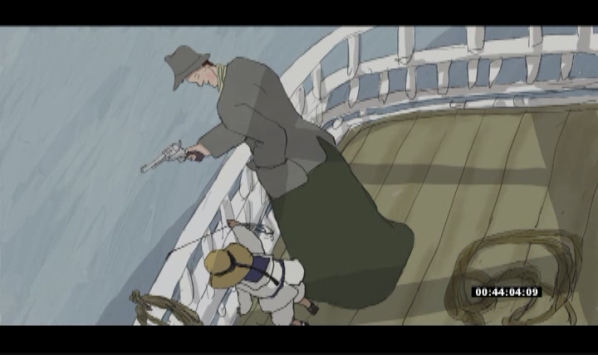
“With animation we can do more than describe reality, we can feed in secondary information…we can compress stories in a meaningful way.” explained renowned animator, Paul Fierlinger, this Monday, May 16, 2011, at the Tel Aviv Cinematheque. As distinguished participants of DocAviv 2011, Fierlinger, together with his wife and artistic collaborator, Sandra, held the festival’s “Anima-Doc” workshop. There, Israeli film professionals and students could acquire the appropriate, and very necessary, animator’s perspective on documentary filmmaking.
With well over 30 years of experience, Fierlinger knows the animation industry inside and out. He has worked with many studios, and has had exceptional success with PBS, where he was not only one of the first directors of the original Sesame Street, but also a director of 7 short films, over the years. Yet, with no contradiction to his commercial success, Fierlinger has also been placing his artistic thumbprint on personal animated documentaries, and it is admirable to see how he was able to unite his commercial and artistic endeavors throughout his career.
Each one of his animated documentaries is indeed auteur-driven, which is partly manifested by his choice of technique. And though the films usually present a collection of characters and stories, Fierlinger stresses that each of them, in some way or another, is personally connected to his own life experiences.
His first animated doc, created in 1989, And Then I’ll Stop, was a commissioned film about alcohol and drug abuse, which won 25 awards, and still shown throughout the U.S. for educational purposes. Fierlinger considers this his most successful film, and extracted insights from it about the power of animated documentaries. The six characters, for instance, are each displayed is a somewhat different drawing style, and the animated action, not only aims at describing the character’s experience, but also interprets the situation, giving the film a greater sense of depth. It is a film he found personally therapeutic, but, nevertheless, he adds that both the anonymity of the participants, and the universality of the animation make this film accessible to everyone.
The Fierlingers created several more widely embraced animated documentaries in the following years. In 1999, Oxygen Network commissioned Drawn From Life, a series of 2-minute films, which portrayed the everyday lives of ordinary women. The series, originally intended for promotional branding of the network, later won the “Gran Prix” at the Ottawa Animation Film Festival in 2000. The PBS commissioned Still Life With Animated Dogs, premiered a year later, in 2001, and became the most widely aired film in the history of public television. Partly autobiographic, the film relates directly to the time the artist spent in communist Czechoslovakia and his relationship with his pet dogs. The film went on to win first prize at the 2002 Zagreb International Animation Festival, and the prestigious Peabody award for excellence.
Both Still Life and his next film, A Room Nearby from 2003, a collection of stories about loneliness, exemplify his sketchy and loose drawing style, which combined with the narration, create an intense sense of maturity. It is with the same serious approach that Fierlingers took on New Year Baby, which premiered in 2008, where they addressed the horrors of the Khmer Rouge regime in Cambodia. “If animated docs want to make an impression,” Fierlinger notes, “they have to be as far away from children’s animation as possible.”
Following the prolific production of short films, in 2004 the Fierlingers began their work on a feature length animated film, which was finally completed in 2009. My Dog Tulip, was applauded by reviewers and audiences alike, and was also a non-fiction tale; the film is based on the memoirs of the British novelist J.R. Ackerley. Despite Tulip’s eventual distribution success, the Fierlingers decided to approach their new project in an entirely different and completely innovative way.
- Image from Paul and Sandra Fierlinger’s Slocum Out at Sea, a work in progress
The work in progress, currently titled Slocum at Sea, is an 88-minute film which will depicts the adventures of pioneer sailor Joshua Slocum, the first man to ever sail single-handedly around the world. The piece bears similarity to the Fierlingers’ other projects in the sense that it is an animated documentary, yet in almost every other sense it will differ from anything they have ever created in the past.
Much like the hero of their new film, the Fierlingers too show a determined and pioneering spirit, as they plan to produce, animated, and distribute the film singlehandedly, and then release it out into the vast ocean of media consumption, the internet. Quite unbelievably, this ambitious film, is a purely independent project, and will be available solely online. This marketing decision, in turn, inspired the Fierlingers to make adjustments to the form of the piece.
Visually, the film exhibits many characteristics you might attribute to a novel, such as ample use of text, and slow, thoughtful pacing, which will enable it to be distributed in episodes. Fierlinger believes that the future of media distribution lies in the internet alone, and that as a filmmaker he needs to find new ways to address his “audience of one”. The viewer’s attention needs to be captured differently if a film is to be watched on one’s computer or iPad, rather than experienced collectively in a movie theater. There is no denying the way we consume films has changed dramatically, and the Fierlingers, as filmmakers, are changing the films accordingly.
The Fierlingers brought with them the legacy of animated documentary, but also the air of change and regeneration of the art of documentary film. It is this kind of forward thinking that was a perfect fit for the cutting-edge atmosphere at DocAviv this year. Hopefully, we will have more opportunities to witness the development of animation documentary in future editions, and perhaps even have an Anima-Doc competition as part of the festival. The Fierlingers’ workshop may be just the beginning, opening the door for the Israeli film-lovers community to savor much more encounters with animated docs and their creators.
Daniela Sherer is an animator and filmmaker from Tel Aviv. www.danielasherer.com






